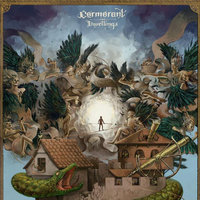 Informazioni sulla canzone In questa pagina puoi leggere il testo della canzone Junta , di - Cormorant.
Informazioni sulla canzone In questa pagina puoi leggere il testo della canzone Junta , di - Cormorant. Data di rilascio: 05.12.2011
Lingua della canzone: Inglese
 Informazioni sulla canzone In questa pagina puoi leggere il testo della canzone Junta , di - Cormorant.
Informazioni sulla canzone In questa pagina puoi leggere il testo della canzone Junta , di - Cormorant. Junta(originale) |
| What horrors we wage |
| in the light of day, |
| bodies left decaying |
| for the world to see. |
| Conakry, |
| September, two thousand nine. |
| Moïse Dadis, |
| junta chief, will not resign |
| his command |
| to sworn democratic law. |
| Thousands band |
| to demand that he withdraw. |
| Crowd trapped. |
| Soldiers |
| gather, |
| guns drawn. |
| Fire. |
| Butchery veiled in tear gas, |
| bayonettes puncture eyes. |
| Flesh strewn across the grass, |
| knives sever robes from thighs. |
| Women raped with gun barrels, |
| bullet through a child’s head, |
| howls of humans feral |
| as they haul away the dead. |
| Red berets, |
| elite guard, |
| murder-crazed, |
| a city scarred. |
| Stores they loot, |
| ribs they snap |
| under boot. |
| Cadavers wrapped. |
| «C'est du |
| jamais-vu,» |
| they said. |
| «Pourquoi |
| nous, Allah?» |
| they pled |
| to absent god. |
| At the morgue a mother |
| seeks out her son. |
| No remains were found. |
| A desperate father |
| reaches for his gun, |
| his daughter bound |
| in an army base, |
| used by soldiers in turn, |
| ‘til a rapist discerned |
| her familiar face, |
| and, shamed, set her |
| free. |
| She speaks no word to her doctor, |
| for fear her pain disgrace her kin. |
| For weeks she dared not sleep or dream. |
| Camara denied blame for the atrocity: |
| «The military’s beyond my control.» |
| The chief of his guard drew a pistol |
| and fired a round in the president’s |
| skull. |
| He survives, |
| abdicates. |
| A flood of |
| candidates |
| compete in Guinea’s |
| first truly |
| democratic vote. |
| Anarchy |
| mars the year. |
| Election |
| frauds unclear. |
| Will of the people: |
| Guineans elect |
| Alpha Condé. |
| The girl’s suicide, |
| the son never found, |
| the butchers alive. |
| The butchers alive. |
| (traduzione) |
| Quali orrori comminiamo |
| alla luce del giorno, |
| corpi lasciati in decomposizione |
| affinché il mondo lo veda. |
| Conakry, |
| Settembre, duemilanove. |
| Moise Dadis, |
| capo della giunta, non si dimetterà |
| il suo comando |
| a giurare la legge democratica. |
| Migliaia di banda |
| chiedere che si ritiri. |
| Folla intrappolata. |
| Soldati |
| mettere insieme, |
| pistole estratte. |
| Fuoco. |
| Macelleria velata di gas lacrimogeni, |
| le baionette perforano gli occhi. |
| Carne sparsa sull'erba, |
| i coltelli tagliano le vesti dalle cosce. |
| Donne violentate con canne di fucile, |
| proiettile nella testa di un bambino, |
| ululati di umani selvaggi |
| mentre trascinano via i morti. |
| berretti rossi, |
| guardia d'élite, |
| pazzo di omicidio, |
| una città segnata. |
| Negozi che saccheggiano, |
| costole si spezzano |
| sotto lo stivale. |
| Cadaveri avvolti. |
| «C'est du |
| giamais-vu,» |
| loro hanno detto. |
| «Purquoi |
| nous, Allah?» |
| si sono impegnati |
| all'assenza di Dio. |
| All'obitorio una madre |
| cerca suo figlio. |
| Non sono stati trovati resti. |
| Un padre disperato |
| prende la sua pistola, |
| sua figlia legata |
| in una base militare, |
| utilizzato dai soldati a loro volta, |
| finché uno stupratore non ha discernuto |
| il suo volto familiare, |
| e, vergognoso, l'ha incastrata |
| libero. |
| Non dice parola al suo dottore, |
| per paura che il suo dolore disonori i suoi parenti. |
| Per settimane non ha osato dormire o sognare. |
| Camara ha negato la colpa per l'atrocità: |
| «L'esercito è fuori dal mio controllo.» |
| Il capo della sua guardia estrasse una pistola |
| e ha sparato in quella del presidente |
| cranio. |
| Egli sopravvive, |
| abdica. |
| Un diluvio di |
| candidati |
| competere in Guinea |
| prima veramente |
| voto democratico. |
| Anarchia |
| marte l'anno. |
| Elezione |
| truffe poco chiare. |
| Volontà del popolo: |
| Eletti i guineani |
| Alfa Condé. |
| Il suicidio della ragazza, |
| il figlio non ha mai trovato, |
| vivi i macellai. |
| I macellai vivi. |